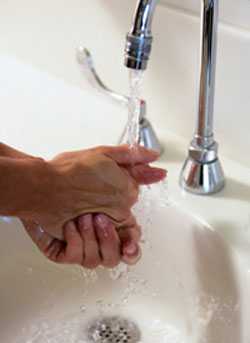Learn About Cronobacter Infection

Getting sick with Cronobacter does not happen often, but infections in young infants can be deadly. Learn what steps you can take to protect your baby from getting sick.
Cronobacter, formerly known as Enterobacter sakazakii, is a group of germs that can be found naturally in the environment. The germs can also live in dry foods, such as powdered infant formula, powdered milk, herbal teas, and starches. Health officials have also found Cronobacter germs in other places like sewer water. Anybody can get sick from Cronobacter, but the infection occurs most often in infants.
Rare, but Serious Illness in Infants
Cronobacter infections are rare, but they can be deadly in newborns. Infections in infants usually occur in the first days or weeks of life. CDC is usually informed of about 4-6 cases a year, however state health departments are not required to report Crononbacter infections to CDC.
Cronobacter germs can cause dangerous blood infections (sepsis) or infections of the linings surrounding the brain and spine (meningitis). Infants two months of age and younger are most likely to develop meningitis if they get sick with Cronobacter. Infants born prematurely and infants with a lower ability to fight germs and sickness due to illness (such as HIV) or medical treatment (such as chemotherapy for cancer) are also more likely to get sick.
The first symptom of Cronobacter infection in infants is usually a fever, coupled with poor feeding, crying, or very low energy. Parents or caregivers should take an infant with these symptoms to see a doctor.

Breastfeeding helps prevent many kinds of sicknesses among infants.

If your baby gets powdered infant formula, there are things you can do to protect your baby from sickness from many germs.

Wash your hands carefully with soap and water, especially after using the toilet or changing diapers.
Follow these 5 guidelines to protect your baby from Cronobacter:
- Breastfeed. Breastfeeding is one of the best things you can do for your baby’s health, and benefits include preventing many kinds of infections. CDC reported very few cases of Cronobacter infections among infants who were fed only breast milk and no formula or other foods.
- Clean, sanitize, and store feeding items and breast pump parts safely. You can help prevent contamination with germs and keep the milk you feed your baby safe by carefully cleaning, sanitizing, and safely storing
- baby bottles,
- other feeding items,
- breast pump parts (if you are pumping milk).
For detailed information visit How to Clean, Sanitize, and Store Infant Feeding Items and How to Keep Your Breast Pump Clean: The Essentials.
- Use liquid formula, when possible. If your baby gets formula, choose infant formula sold in liquid form over powdered, especially when your baby is a newborn or very young. Liquid formula is made to be germ-free and should not contain Cronobacter germs.
- Prepare powdered infant formula safely. Keep powdered formula lids and scoops clean and close containers of infant formula or bottled water as soon as possible. The best way to prepare formula is to follow the steps below:
- Warm water to at least 158 °F /70 °C and pour it into the bottle.
- Add formula, and carefully shake, rather than stir the bottle.
- Cool the formula to ensure it is not too hot before feeding your baby by running the prepared, capped bottle under cool water or placing it into an ice bath, taking care to keep the cooling water from getting into the bottle or on the nipple.
- Before feeding the baby, test the temperature by shaking a few drops on your wrist.
Use formula within 2 hours of preparation. If your baby does not finish the entire bottle of formula, throw away the unused formula. If you do not plan to use the prepared formula right away, refrigerate it immediately and use it within 24 hours. Refrigeration slows the growth of germs and increases safety. Remember, when in doubt, throw it out.
- Practice proper hygiene! Always wash your hands carefully with soap and water during key times.
- Before preparing and feeding bottles or foods to your baby.
- Before touching your baby’s mouth.
- Before touching pacifiers or other things that go into your baby’s mouth.
- After using the toilet or changing diapers.
If soap and water are not available, use an alcohol-based hand sanitizer with at least 60% alcohol (check the product label to be sure). Hand sanitizer with at least 60% alcohol is effective in killing Cronobacter germs. But use soap and water as soon as possible afterward because hand sanitizer does not kill all types of germs and may not work as well if hands are visibly greasy or dirty. It is also important to keep all objects that enter baby’s mouths (such as pacifiers and teethers) clean.
Not Just Infants
Cronobacter can also cause diarrhea and urinary tract infections in people of all ages. The infection can be serious for older people and for people whose immune systems are weakened by other illnesses or conditions. They are also more likely to get sick.
More Information
Food Safety and Handwashing:
- WHO: Safe preparation, storage, and handling of powdered infant formula guidelines [361 KB]
- Foodsafety.gov: Baby food and infant formula
- Handwashing: Clean Hands Save Lives, hand- and water-related hygiene tips
Breastfeeding:
- Page last reviewed: April 10, 2017
- Page last updated: April 10, 2017
- Content source:
- National Center for Emerging and Zoonotic Infectious Diseases, Division of Foodborne, Waterborne, and Environmental Diseases
- Page maintained by: Office of the Associate Director for Communication, Digital Media Branch, Division of Public Affairs




 ShareCompartir
ShareCompartir